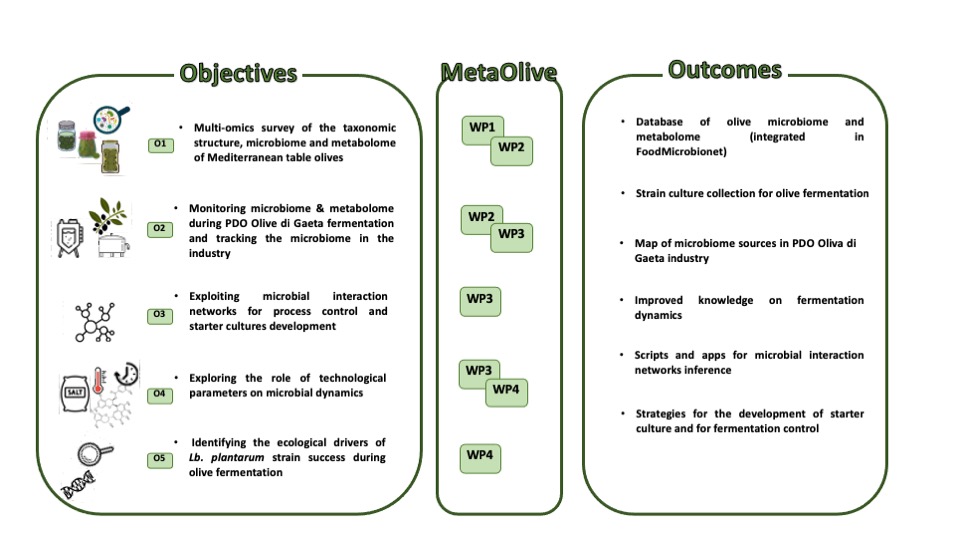Fermentation is one of the most ancient preservation methods and improves safety, sensory and nutritional properties and sustainability. Production of many fermented dairy and meat products, bread doughs and alcoholic beverages is mostly industrialized, with the use of starters and/or heat treatments, but vegetable fermentations are usually carried out on raw materials with no starter addition. Sauerkrauts, pickles and table olives are the main fermented vegetables in Europe. Fermented olives (Greek or Spanish-style) are important from an economic and a nutritional standpoint in Mediterranean countries. Several papers and reviews describe the microbiology of the process, but multi-omic studies on olive fermentation are rare. In addition, most studies are narrowly focused, use a limited number of samples and are difficult to compare. While it is well known that lactic acid bacteria (LAB, especially Lactiplantibacillus spp.) are key to the success of fermentation, the role of other microbial groups (including yeasts and several halophiles) and their interactions and role in spoilage is less clear. Our objective is to significantly advance the state of the art on the microbiology of fermented olives in the Mediterranean area using a multi-omic approach, to obtain a better understanding of the fermentation process. We will also perform an in depth study of fermentation dynamics and of sources of contamination for one important Italian variety (Oliva di Gaeta PDO), to identify sources of microorganisms and obtain hints for improved process control. Dominant bacterial strains will be isolated in both phases and the genomes of representative strains will be sequenced. For the first time, a detailed study of microbial association networks, both at the genus and species level, and using metagenomic data, at the strain level, will be performed and the basis for interactions will be confirmed by in-vitro experiments. Finally, a multi-omic factorial experiments will be used to understand the role of key technological factors (T°C, NaCl, phenolics, starter addition) on fermentation dynamics, down to the strain level and to obtain insights on the genetic determinants for the ecological success of strains. We are confident that the output of this project will contribute to the understanding of key ecological processes in microbial ecology (contamination, dispersal, selection, etc.) and to the knowledge of the genetic determinants of the success of LAB in vegetable fermentations. The results will also be valuable for stakeholders potentially contributing to the identification of biological markers for PDO varieties and providing valuable information on the role and genomes of beneficial and detrimental microorganisms, their sources and means for their control.

This project is co-funded by Ministero dell’Università e della Ricerca PRIN 2022, proposal 2022NN28ZZ, and received funding from the European Union Next-GenerationEU (PIANO NAZIONALE DI RIPRESA E RESILIENZA (PNRR)).
The project duration is 2 years, starting from October 2023.
The research Units are:
- Prof. Eugenio Parente, Laboratory of Industrial Microbiology, Dipartmento di Scienze Agrarie, Forestali, Alimentari ed Ambientali, Università degli Studi della Basilicata, principali investigator
- Prof. Francesca De Filippis, Dipartimento di Agraria, Università degli Studi di Napoli “Federico II”

